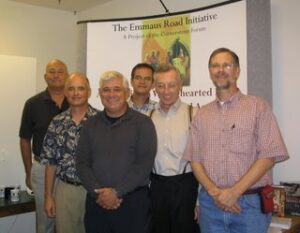Ten Years Ago….

August 27, 2006 marked the beginning of The Cornerstone Forum’s foray into what was then already a large and growing online “weblog” phenomenon with the launch of Reflections on Faith and Culture. In 2006 Facebook was mostly a feature of college and high school life and the iPhone was a year away from being released to the public. In the days prior to the new ‘blog’ Gil Bailie had been posting short reflections on an early iteration of the Cornerstone Forum (nee Florilegia Institute) website. That old website is no longer available online. However, we do have pieces of it stuck away on backup hard drives. And as with most of Gil’s writing it has withstood the vagaries of changing times pretty well. So, I will be dusting off some of these pieces and, as with our ‘audio archives’, making them available again to what we hope are new or more recent followers of the Cornerstone Forum’s work. This is not meant to be merely an exercise in nostalgia. (Though it certainly is nostalgic for me.) It is also a demonstration of the comprehensive and insightful nature of Gil Bailie’s work over the years, and of why we believe it is important to keep these materials available for years to come. René Girard alluded to just this aspect of Gil’s work in the foreward to Violence Unveiled:
Such is the talent of Gil Bailie and the power of his analyses that he can bring together Bob Dylan and the Aztec myth of Tezcatlipoca without giving an impression of disharmony or discontinuity….He can make Aeschylus accessible through Rodney King and purify Rodney King of journalistic clichés by placing his affair in an Aeschylian light.
Here is a re-post from that August 2006 blog launch:
“Isaac reopened the wells dug by the servants of his father Abraham and blocked up by the Philistines after Abraham’s death, and he gave them the same names as his father had given them” (Gen. 26:18).
For years, The Cornerstone Forum has had as its principle theme the phrase “Keeping Faith and Breaking Ground.” The term has its value, and we will almost surely continue to invoke it here and there. It comes to mind today, as we are experimenting with the idea of launching a weblog. It seemed only natural to include the phrase on the blog as we have so often included it on other of the things we have done. I am the person responsible for the use of the phrase, but there has always been something about it that didn’t quite sit right with me. In a word: the subtle presumption involved in proposing to break new ground.
It is, I think, unquestionably true that the work of René Girard throws enormous light on what I variously call Christological Anthropology or the Perichoretic Anthropology, and it is likewise the case, I believe, that as we look through the lens that Girard’s work provides we will be able to recognize the universality and uniqueness of Christianity with tools not before available to us and in ways that will contribute significantly to our ability to evangelize our weary world and catechize the young. Speaking from experience, I can predict that those who peer through the anthropological lens Girard’s work provides will experience Christianity and the Christian truth claims as if for the first time. The experience will be a kind of ground-breaking experience. In truth, however, it will simply be another instance of what has happened ever and again throughout history.
Christian faith is ever-ancient, ever-new. As Eliot reminded us, we are always having to return to where we started and know the place for the first time. It was also Eliot who reminded us that this recovery takes places today “under conditions that seem unpropitious.” So my mind turns to Isaac, who was indeed “breaking ground,” but who would probably have omitted the claim to have been doing so, inasmuch as he was simply re-digging the wells of Abraham that the Philistines had filled with the desert sand. What is particularly poignant to me about this one-sentence allusion in the Book of Genesis is the notation that Isaac gave these wells the same names that his father had given them. There is something there for us today, it seems to me; a sense of our humble place in the scheme of things, a degree of anonymity that is proper to the transmission of the mysteries of faith.
Just a thought.

